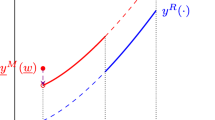Abstract
We consider the problem of allocating some amount of a commodity among a group of agents with single-peaked preferences. We show that the uniform rule is the only rule satisfying equal treatment of equals, Pareto efficiency, and strategy-proofness. This characterization strengthens two interesting results due to Sprumont (1991). Our method of proof involves only elementary arguments.
Similar content being viewed by others
References
Benassy JP (1982) The economics of market disequilibrium. Academic Press, New York
Ching S (1992a) A simple characterization of the uniform rule. Econ Lett 40: 57–60
Ching S (1992b) Strategy-proofness and ‘median voters’. University of Rochester mimeo
Foley D (1967) Resource allocation and the public sector. Yale Econ Essays 7: 45–98
Moulin H (1980) On strategy-proofness and single peakedness. Pub Choice 35: 437–455
Moulin H (1984) Generalized Condorcet-winners for single peaked and single-plateau preferences. Soc Choice Welfare 1: 127–147
Sprumont H (1991) The division problem with single-peaked preferences: A characterization of the uniform allocation rule. Econometrica 59: 509–519
Thomson W (1991a) Consistent solutions to the problem of fair division when preferences are single-peaked. University of Rochester mimeo, J Econ Theory (forthcoming)
Thomson W (1991b) Resource-monotonic solutions to the problem of fair division when preferences are single-peaked. University of Rochester discussion paper
Thomson W (1991c) Population-monotonic solutions to the problem of fair division when preferences are single-peaked. University of Rochester discussion paper, Econ Theory (forthcoming)
Thomson W (1992a) Manipulation and implementation of solutions to the problem of fair division when preferences are single-peaked. University of Rochester mimeo
Thomson W (1992b) The replacement principle in private good economies when preferences are single-peaked. University of Rochester mimeo
Author information
Authors and Affiliations
Additional information
I wish to thank Professor William Thomson for his enormous efforts in supervision. I am grateful to Professor Marcus Berliant and Hideo Konishi for their useful remarks and especially to an anonymous referee for insightful comments. All remaining errors are my own responsibility.
Rights and permissions
About this article
Cite this article
Ching, S. An alternative characterization of the uniform rule. Soc Choice Welfare 11, 131–136 (1994). https://doi.org/10.1007/BF00179209
Received:
Accepted:
Issue Date:
DOI: https://doi.org/10.1007/BF00179209




